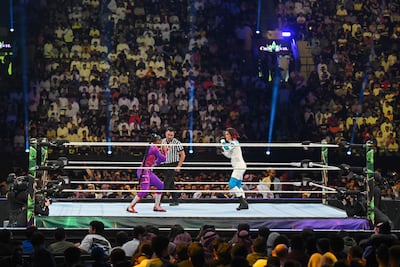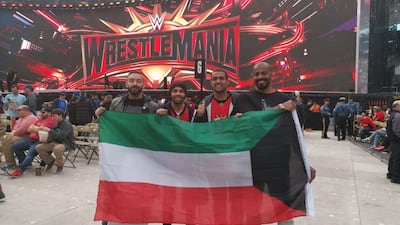Last week, it was confirmed that WrestleMania 43 will head to Saudi Arabia in 2027, marking the first time WWE’s annual event – dubbed “the greatest spectacle in sports entertainment” – will take place outside North America.
When chief content officer Paul Levesque, better known to fans as Triple H, made the announcement in Las Vegas, the backlash was immediate. Comment sections on social media lit up with accusations that WWE had “sold out”, while fans chanted the phrase when a promotional video for the Riyadh event aired during a live show.
I grew up in the US watching wrestling, buying pay-per-views and eventually attending WrestleMania 35 in New Jersey in 2019. Less than a year later, I was at Super ShowDown, a WWE premium live event, held in Riyadh.
I wasn’t sure what to expect in, but I soon found the Saudi event was as electric and intense as its American counterpart. Fans filled the arena hours before the first bell, families came wearing T-shirts of their favourite superstars and chants broke out in English and Arabic alike.
The passion was just as authentic, just as overwhelming and, in some ways, even more moving because I could tell how much it meant for local fans to be part of something they had long watched from afar. Even though I was by myself, it didn't feel that way because I was enjoying the show with fellow enthusiasts.
In Riyadh, I met a Saudi fan, Samah, who was such a big admirer of The Undertaker that she'd brought her own handmade sign reading: “I would pay millions to see you wrestle Taker.” She told me she'd been watching wrestling for more than 15 years, since the age of six.
I also met families who brought young children, proudly naming Roman Reigns and Bayley among their favourites. I could see how happy they were to be there.

The backlash, then, doesn’t feel fair. Wrestling fandom has never been confined to one country, region or tradition. Too often, the criticism leans on outdated stereotypes about the Middle East, overlooking the reality that the sport has a vibrant, dedicated following here as well. Just because Saudi Arabia has invested heavily to host WWE events doesn’t mean this is only about money; public passion justifies the move on its own.
Every year, there are concerns whenever WWE stages a show in Saudi Arabia, from questions over which superstars will appear to the fact that female wrestlers need to modify their ring gear to align with local guidelines. But interestingly, it’s often male fans who bring up that last point, yet again choosing to speak for women as if they were being pushed into something against their will. In reality, the women who’ve wrestled in the kingdom have treated it as a milestone moment, not a setback. I would know, as I’ve interviewed several of them when they were here.
Bayley told The National in 2020: “Since I’ve joined the WWE, we’ve always had the idea of changing the perception of women’s wrestling. In Saudi, I think we want to change the perception of women in all sports and what women are capable of. It means a lot.”

Naomi said: “It’s a win-win for me to even be here and have this opportunity. Whether I win or lose, I will not walk away feeling like I lost out on anything because I’m super-proud and happy to be here and see the progress that’s happening and be a part of that.”
And, really, ring gear has little to do with a female wrestler's ability to perform, which is why I don’t see it as the obstacle some critics make it out to be.
On a more sentimental level, many fans in North America or Europe feel that WrestleMania should “remain theirs”, with some lobbying for London or another major European city were the event to move abroad. Yet woven into some of the criticism is a subtle bias: the idea that fans in the Middle East are somehow less deserving of being able to attend the event live.
In recent years, WWE has leaned into its international fan base by staging premium live events around the world, such as Cardiff, Paris and Perth, often with impressive results. Whether it is fans loudly singing along to Randy Orton’s theme song or chanting in unison for their favourite wrestlers, it’s clear the company has a strong influence, no matter where its shows are held.
For many in the Middle East, attending WrestleMania abroad isn’t just a dream, it’s a costly hurdle. Travel packages from the region are significantly more expensive, owing to long-haul flights and logistical complexity.
Standard packages, which include event tickets, hotel stays and fan experiences, often cost between £3,500 and £4,800 (up to Dh24,000) per person in the UK. By the time flights from cities such as Dubai, Muscat or Doha are factored in, costs for Middle Eastern fans can climb into thousands more. For those seeking premium seating or VIP upgrades, the total can be upwards of Dh35,000 per person.

If WWE wants to be a truly global brand, its biggest stage should not be limited by geography. Holding WrestleMania in Riyadh is a statement. For young fans in the region, it’s proof that their passion matters. It tells them they don’t have to dream about attending WrestleMania on another continent thousands of miles away, with extra costs and visa hurdles. This time, it’s coming to them.
Sport and entertainment have always carried symbolic weight. The Olympics rotate around the globe for a reason. The World Cup moves every four years to bring the game to new audiences. After four decades, WrestleMania has earned that same stature.
Having seen both sides – the grandeur of WrestleMania in the US and the fervour of fans in Saudi Arabia – I believe Riyadh deserves this moment. In 2027, the world will be watching, regardless of the current criticism.
And when that first entrance theme hits and the crowd erupts, it won’t matter where WrestleMania is held. What will matter is the passion of the sport's biggest supporters.


